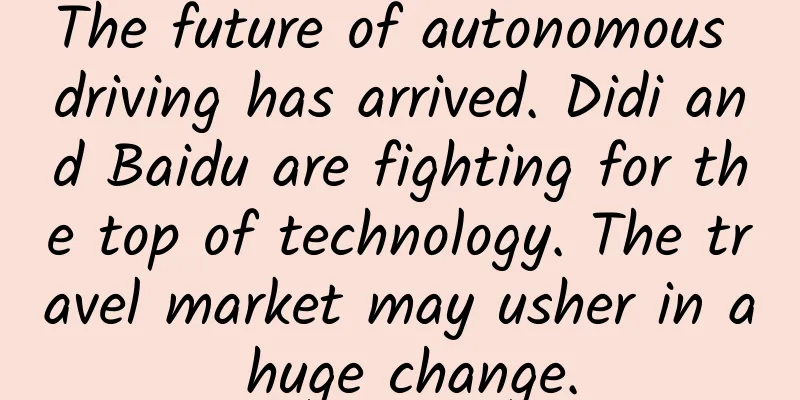The future of autonomous driving has arrived. Didi and Baidu are fighting for the top of technology. The travel market may usher in a huge change.

|
Some time ago, the sales of the three giants of China's new car-making forces, NIO, Xpeng and Li Auto, since January this year were disclosed. The delivery volumes of 34,000, 24,000 and 22,000 were close to their respective total delivery volumes in 2020. Such outstanding results are closely related to the intelligent systems centered on autonomous driving that these three manufacturers have devoted themselves to developing. It is well known that their opposite - traditional car companies - are not good at developing software. At this time, autonomous driving technology from the Internet has become the most urgently needed external aid for traditional car companies. With the participation of Internet companies, the current smart car market structure may soon usher in a wave of bloody storms. The advantages of Internet-based autonomous driving cannot be underestimated It is undeniable that new car-making forces have stronger software production capabilities than traditional car companies due to the Internet product genes that existed at the beginning of their establishment. However, when traditional car companies with stronger engineering capabilities cooperate with Internet manufacturers who also have excellent software production experience, the competition in the smart car market has added a lot of variables. Although new car manufacturers have made great achievements in the field of autonomous driving, Internet companies led by Baidu have also reaped great rewards in autonomous driving technology. Baidu entered the field of autonomous driving in 2013 and has accumulated more than 2,900 automobile-related patents so far, and the number of road test licenses it has obtained accounts for more than half of the total number in the country. Didi has also invested a lot of resources in the research and development of autonomous driving technology. The head of Didi's autonomous driving business once said that they have begun to install sensors on a large scale on their online ride-hailing cars to obtain road condition information and drivers' actual driving behavior data. This year, Didi released a video of its autonomous driving car's 5-hour road test without taking over, showing its ability to overtake in narrow roads and turn around at large intersections, which also won the praise of the founder of Google's driverless car project. Therefore, in terms of R&D experience in autonomous driving technology, new car manufacturers do not have the so-called "absolute advantage" compared to Internet companies. Instead, they still need to speed up their R&D pace to prevent being overtaken by Internet companies that enter the smart car market later. Didi, which entered the smart car market relatively late, has received a total investment of US$800 million in less than a year. Internet companies do not have the financing problem that has always been a headache for new car manufacturers. This is due to the capital's pursuit of the smart car market, and it also shows that capital has confidence in large Internet companies to do a good job in autonomous driving technology. After gaining the trust of the capital market, Internet companies can easily cooperate with conservative traditional car manufacturers. In January this year, Baidu announced that it would form a joint venture with Geely to build a smart car company, which shocked the industry. This shows that The cooperation model of "traditional car companies developing hardware + Internet companies developing software" has been formed. The new car-making model of strong alliance and mutual complementation has begun to impact the "software and hardware integration" model of new car-making forces. The idea of Internet companies and traditional car companies jointly building cars can be said to be completely pressing the lifeline of new car-making forces. In the case of similar autonomous driving technology capabilities and peripheral software development capabilities, traditional car companies are recognized for their excellent control over development cycles and quality. From the fact that new car-making forces continue to tap into the executives and R&D teams of traditional car companies such as GAC and Geely, it can be seen that they also recognize the R&D capabilities of traditional car companies. As a result, new car manufacturers that have frequently encountered difficulties in financing and have backward automotive engineering technology obviously no longer have much advantage in the upcoming competition in the smart car market. The secret invasion of the field of autonomous driving by Internet companies has just begun, and commercial markets such as Robotaxi are the markets they most want and are best at. In the Robotaxi market, Baidu and Didi are fighting for the top technology If the new car-making forces just mentioned have obviously insufficient accumulation in automotive engineering compared with traditional car companies, then Internet companies can be said to know basically nothing about automotive hardware manufacturing. However, this does not prevent them from eating up the cake of the commercial self-driving car market with the business model they are most familiar with. According to survey data released by CNNIC, the number of online car-hailing users in China reached 365 million in December 2020, an increase of 2.98 million compared to March 2020. This set of data undoubtedly shows that the current taxi market is not only a large market, but also a market with room for growth. Online car-hailing that provides car services to a large number of users is the next growth point of the smart car market. Robotaxi, which is repeatedly mentioned by a number of Internet companies today, hopes to change the service vehicles in the taxi market from being driven by people to being driven by computers. Currently, Baidu is the company that has invested the most in the Robotaxi market. Baidu Apollo has already carried out many large-scale self-driving taxi tests in various parts of China in the past few years. There are traces of Baidu Apollo Robotaxi self-driving taxi fleets in Yizhuang, Haidian, Shunyi and Changsha in Beijing. On the other hand, as a giant in the taxi market, Didi is also actively exploring the company's new operating model in the upcoming Robotaxi market. It is foreseeable that a technological confrontation between Baidu and Didi in the Robotaxi field is inevitable in the future. However, in terms of specific business direction, Baidu and Didi's Robotaxi routes are fundamentally different. Baidu Apollo business-related personnel publicly stated that Baidu will not be the operator of the Robotaxi market, but will deliver the technology to capable operators. This shows that Baidu wants to be a core technology supplier like Huawei in the Robotaxi market, componentize its own product technology, and provide a package solution for companies with customized needs. It has to be said that Baidu's positioning is very consistent with its actual capabilities. After all, the online car-hailing market is almost a foregone conclusion. According to previous data from the Ministry of Transport, there are more than 200 online car-hailing platforms on the list, but they only account for 10% of the market share. Any new platform cannot defeat Didi, which has already occupied an absolute position. It is difficult to make a living. Becoming a core supplier means that it can not only operate in the Chinese market, but also cooperate with Uber and other taxi companies in the global market to achieve product globalization. On the other hand, Didi's goal in making Robotaxi is to replace its contracted online car-hailing drivers, thereby reducing operating costs and strengthening its dominance in the taxi market. According to data released not long ago, Didi's online car-hailing drivers' income accounts for 79.1% of the fees paid by passengers, and the popularization of self-driving taxis on the commercial side can directly eliminate this part of the expenditure; in terms of safety and compliance, it can also effectively avoid various safety issues caused by existing drivers and passengers and improve brand reputation; driverless online car-hailing controlled by Didi can also be dispatched more efficiently in extreme weather, thereby saving driving costs and improving passenger turnover. The official entry of Internet companies into the smart car market is both unexpected and reasonable. They are sensitive to the direction of technological progress and have made arrangements in the field of autonomous driving many years in advance, which fully demonstrates their excellent foresight. The recognition of capital is a natural thing. The Internet-side technology with obvious advantages, combined with traditional car companies, will be the most difficult opponent for new car-making forces. In addition, traditional Internet companies with the motto of "entering a new industry and disrupting it" have also set their sights on the taxi market. Following online car-hailing, they have proposed and implemented the Robotaxi concept, which has not only disrupted the existing taxi market business model, but also gradually revealed the shape of future urban transportation. Baidu and Didi will also face fierce competition in the future. As for which of the two rivals will be the first to seize the track, time will tell. As a winner of Toutiao's Qingyun Plan and Baijiahao's Bai+ Plan, the 2019 Baidu Digital Author of the Year, the Baijiahao's Most Popular Author in the Technology Field, the 2019 Sogou Technology and Culture Author, and the 2021 Baijiahao Quarterly Influential Creator, he has won many awards, including the 2013 Sohu Best Industry Media Person, the 2015 China New Media Entrepreneurship Competition Beijing Third Place, the 2015 Guangmang Experience Award, the 2015 China New Media Entrepreneurship Competition Finals Third Place, and the 2018 Baidu Dynamic Annual Powerful Celebrity. |
<<: Raven CEO Lu Cheng: Raven R is not only a smart speaker, but also a six-axis emotional robot
Recommend
New results from collision! A sensitive probe is now available to explore the difference between positive and negative matter
The Beijing Spectrometer III (BESIII) experiment ...
AI beats human champion again! This time, in drone racing
Artificial intelligence (AI) has once again defea...
Can the money tree really make you rich?
During the Spring Festival when fireworks are ban...
Huge profit red envelope project: a WeChat account can earn more than 10 yuan a day, small rules can make 600+ yuan a day, large-scale operations can make more than 10,000 yuan a day
Baidu Netdisk download location: b1-214-Profitabl...
Why did quantum dots, which can solve the weakness of LCD picture quality, wait until this year to appear?
A new term for LCD TVs has entered the vision of ...
Sharing experience in designing high-conversion e-commerce detail pages!
This article will talk about conversion. Let’s ta...
Young people don't get diabetes? 26-year-old programmer's urine attracts a group of ants
Many people think that diabetes is a problem that...
Changhong leads the intelligent transformation of the air-conditioning industry from the perspective of Feizhu theory
Lei Jun, the founder of Xiaomi, once said a famou...
User operation, how to achieve a breakthrough from 0 to 1?
Users, as one of the most important factors in pr...
Your senses may be underestimated! Today, let's take you to rediscover your sense of smell
Produced by: Science Popularization China Author:...
[Astrology and the True Self] A must-have tool for astrology beginners and practicing astrologers, the most solid and detailed astrology guide
[Astrology and the True Self] A must-have tool fo...
Complete set of skipping rope teaching videos - Children's beginner skipping rope teaching videos (from basics to advanced) Baidu cloud download
Complete set of skipping rope teaching videos - C...
How much does it cost to develop a Gannan shoes and boots mini program?
How much does it cost to attract investment throu...
【Analysis Report】 Metaverse related analysis report Baidu Cloud download
【Analysis Report】Introduction to Metaverse-relate...
This is the most comprehensive guide to all modules of product promotion and operation that I have ever seen!
When it comes to operations , everyone's firs...







![[Smart Farmers] Popular Science Comic丨“The Most Beautiful Chicken” Taihe Black Chicken: My whole body is a treasure!](/upload/images/67f25334a76c0.webp)

